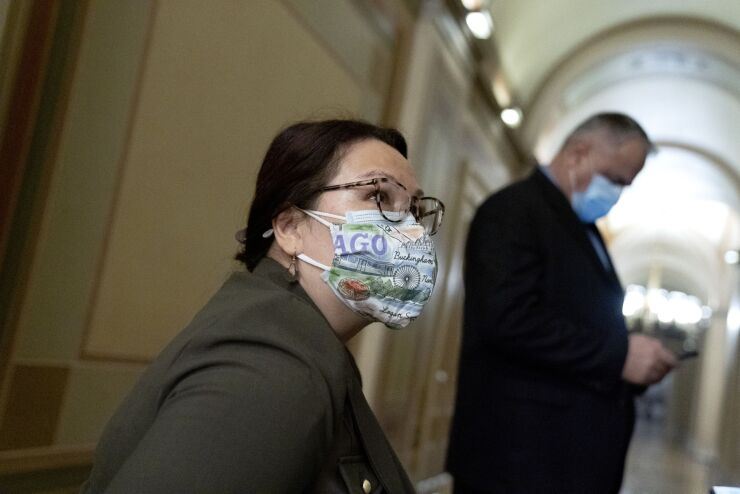Water bills are moving forward in the House and Senate in a bipartisan manner, despite hangups in passing a larger comprehensive infrastructure bill.
The Senate Committee on Environment and Public Works introduced its bill — the Drinking Water and Wastewater Infrastructure Act of 2021 — on Tuesday, authorizing $35 billion for water resource development projects, some of which will go towards low-interest loans. The committee passed the bill 20-0 on Wednesday.
“Rebuilding our water infrastructure must be at the heart of the ongoing ‘Build Back Better’ efforts because we will have missed a huge opportunity to improve American lives if we only fix our roads, but fail to repair and upgrade the pipes beneath them,” said Sen. Tammy Duckworth, D-Ill.

Duckworth was the lead sponsor of the bill, with support from Sens. Shelley Moore Capito, R- W.Va., Tom Carper, D-Del., and Ben Cardin, D-Md. About $14.65 billion will go towards the Clean Water State Revolving Fund and another $14.65 billion to the Drinking Water SRF over the next five years.
The Senate bill is a version of a House bill passed last week — Water Quality Protection and Job Creation Act of 2021. Lawmakers have not decided how both bills would be paid for.
The Senate bill would reauthorize the CWSRF at a much lower amount than the House’s proposal of $40 billion over five years.
The National Association of Counties attributed that difference to the Senate’s more bipartisan approach.
“In order to garner their support, large-scale packages like this often don’t carry as much money as the House would like,” said Adam Pugh, NACo legislative director. “The Senate will also have to pass cloture and they may lose more Republicans with the higher House amount.”
The CWSRF has not had a multi-year reauthorization in decades and gets an annual appropriation of about $1.6 billion, which has remained steady over the past few years.
SRFs act as infrastructure banks by providing low-interest loans for water infrastructure projects. As money is paid back into the state’s revolving loan fund, the state makes new loans for other projects. These recycled payments of loan principal and interest earnings allow the state’s fund to “revolve” over time.
The Drinking Water SRF would be reauthorized at $14.65 billion as well until 2026 in the Senate’s bill.
In 2018, the Water Resources Development Act authorized the Drinking Water SRF for three years at increased funding levels, rising to $1.95 billion in FY2021.
“DWWIA begins to bridge the growing gap in federal cost-share of water infrastructure, which according to the Congressional Budget Office (CBO) is currently less than 5% of total drinking water and wastewater infrastructure investment,” said the National Association of Clean Water Agencies.
The Senate’s bill also reauthorizes the Water Infrastructure Finance and Innovation Act through 2026 at the current funding level of $50 million annually. It also changes a requirement that mandates each WIFIA project applicant provide two final agency rating opinion letters to one from two.
WIFIA provides low-cost loans and loan guarantees to eligible borrowers for water and wastewater projects. It is designed to work with bonds and other funding sources.
The National League of Cities supported the bill on Wednesday.
“Since local governments provide over 95% of the total funding for water infrastructure and the nation’s growing water infrastructure needs, it is evident that our country must make substantial investments to repair and replace our nation’s aging water infrastructure through the SRF programs and the other critical programs included in the legislation,” the group said.
Kishia Powell, NACWA vice president and chief operating officer and executive vice president of DC Water, told a Senate panel last week that public clean water utilities were at a tipping point.
“Already faced with the challenge of maintaining and replacing aging infrastructure, grappling with the impacts of climate change on our most vulnerable communities, and spending billions to meet our compliance obligations; the COVID-19 pandemic has exacerbated the financial strain for many clean water utilities as arrearages have grown to an estimated $8.7 billion in revenue losses,” Powell said.
But while water spending plows ahead on a bipartisan basis, partisan lines are being drawn on a larger infrastructure bill.
Republicans are wary of raising taxes, while Democrats have pushed for a climate-focused bill. That bill is likely to go through the budget reconciliation process — a tool Democrats can use to pass legislation by a simple majority in the Senate instead of the usual 60 required to get a bill across the finish line in that chamber.
Capito hoped bipartisanship as was shown Wednesday, would continue on her committee’s next bill — surface transportation. That committee is expected to introduce their version to reauthorize surface transportation legislation, which expires at the end of September.
“Only two months into this Congress, the committee is passing bipartisan common-sense legislation through regular order,” Capito said. “I think that’s terrific and I look forward for that same path that we’re working on now on our surface transportation reauthorization bill.”





